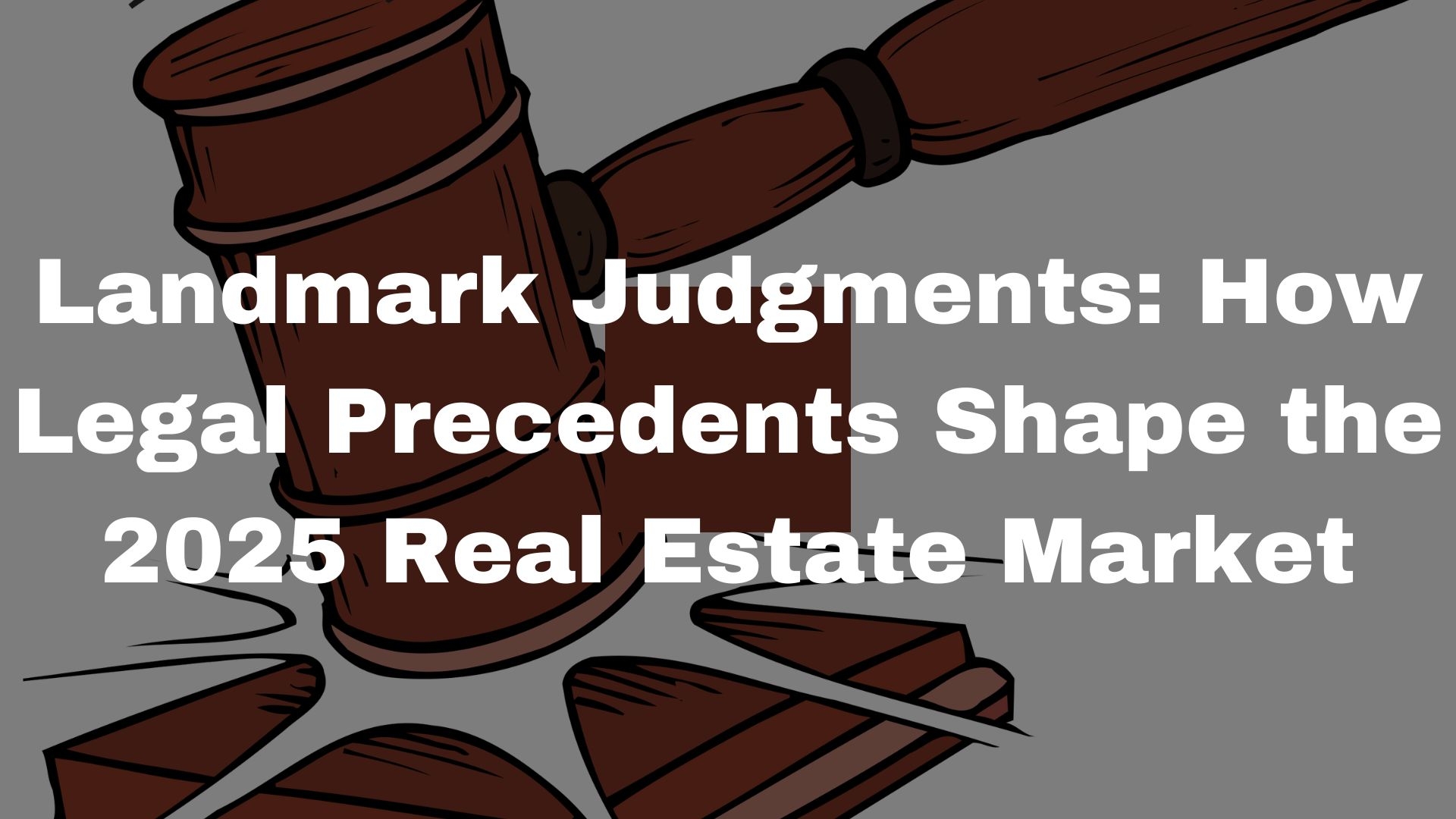
Landmark Judgments: How Legal Precedents Shape the 2025 Real Estate Market
The real estate market is deeply intertwined with legal regulations, with landmark judgments shaping property rights, transactions, and market stability. As we move into 2025, legal precedents are crucial in defining property laws, ensuring investor confidence, and setting the course for future market developments. This article explores key legal precedents affecting the real estate sector, their impact on market trends, and the broader implications for buyers, sellers, and investors.
Understanding Legal Precedents
Legal precedents refer to past judicial decisions establishing a standard for future cases. These rulings become part of common law and influence legislation, contract enforcement, property rights, and dispute resolution in real estate. Courts rely on precedents to ensure consistency and predictability in legal rulings, stabilising the real estate sector.
The Importance of Landmark Judgments in Real Estate
-
Clarity in Property Rights – Landmark judgments define ownership rights, reducing transaction ambiguity.
-
Investor Confidence – Legal certainty encourages domestic and foreign investment in real estate.
-
Market Stability – Judicial rulings protect against unfair practices, ensuring market stability.
-
Dispute Resolution – Precedents offer a reference for resolving property disputes efficiently.
-
Regulatory Compliance – Courts reinforce compliance with zoning laws, environmental regulations, and land-use policies.
Recent Landmark Judgments Shaping the 2025 Real Estate Market
1. Burnett v. National Association of Realtors (2023)
-
Impact: A U.S. federal jury found the National Association of Realtors and brokerages liable for price-fixing, requiring home sellers to pay inflated commissions.
-
Market Effect: Changes in commission structures and increased antitrust scrutiny in real estate transactions.
2. Supreme Court of India on Private Property Acquisition (2024)
-
Impact: The Supreme Court ruled that the state cannot arbitrarily acquire private property under the guise of public interest.
-
Market Effect: Strengthened private property rights, reducing unauthorised government acquisitions.
3. Safari Retreats Private Limited v. Chief Commissioner of Central Goods & Service Tax (2024)
-
Impact: Clarified input tax credit for real estate developers under India's GST system.
-
Market Effect: Provided developers tax relief, improving construction project cost management.
4. Supertech Twin Towers Demolition Case (2021)
-
Impact: The Supreme Court ordered the demolition of illegally constructed towers in Noida, India.
-
Market Effect: Reinforced strict adherence to building codes and regulations, deterring unauthorised construction.
5. Supreme Court's Decision on Ancestral Property Rights (2024)
-
Impact: Confirmed that daughters have equal rights to ancestral property, even if their father passed away before the 2005 Hindu Succession Act amendment.
-
Market Effect: Strengthened gender equality in property inheritance.
How Legal Precedents Influence Market Trends
-
Regulatory Adaptation – Real estate businesses must meet legal standards to avoid litigation.
-
Evolving Investment Strategies – Investors prioritise jurisdictions with clear and favourable legal precedents.
-
Impact on Housing Affordability – Legal restrictions on rent hikes and land use affect housing prices.
-
Sustainability Compliance – Environmental rulings drive green building initiatives and eco-friendly real estate projects.
End Note
Landmark judgments will continue to shape the real estate landscape in 2025 by reinforcing legal clarity, market stability, and investor confidence. As the legal environment evolves, real estate stakeholders must remain informed about judicial precedents to navigate the complexities of property ownership, development, and investment. Understanding these rulings enables proactive decision-making and ensures compliance with the latest legal standards.
In case of any query regarding Landmark Judgments: How Legal Precedents Shape the 2025 Real Estate Market, feel free to connect with our legal experts, Tulja Legal, at +91 96380-69905
About the Author
Anju S Nair
Legal Researcher | LLB, MA English| Corporate Lawyer | Business Enthusiast | Founder & CEO at iLawbook.
FAQs
-
What is a legal precedent in real estate?
A legal precedent is a past court ruling that influences future legal decisions in the real estate sector.
-
How do court rulings impact property prices?
Judicial decisions affecting zoning laws, rent control, and tax regulations can influence demand, supply, and pricing in the real estate market.
-
Can landmark judgments change property ownership rights?
Key rulings can redefine ownership structures, inheritance rights, and foreign ownership policies.
-
Do real estate investors consider legal precedents before investing?
Investors assess legal stability and historical rulings to gauge investment risks.
-
What role do courts play in tenant-landlord disputes?
Courts interpret lease agreements, enforce tenant protections, and adjudicate eviction-related conflicts.
-
How do zoning law judgments affect urban development?
They determine land use, building height restrictions, and commercial versus residential zoning, impacting urban planning.
-
Are legal precedents binding on all future cases?
While not absolute, they strongly influence judicial decisions unless overturned by a higher court.
-
How do environmental rulings affect real estate construction?
Builders must comply with sustainability regulations, which can impact project costs and timelines.
-
What happens if a real estate law conflicts with a judicial precedent?
Courts usually interpret laws in line with precedent, but lawmakers may amend legislation to override judicial decisions.
-
Can landmark judgments lead to new real estate policies?
Significant rulings often prompt legislative reforms to address legal gaps and market needs.
References
-
Burnett v. National Association of Realtors (2023). Wikipedia
-
Supreme Court of India Ruling on Private Property (2024). Economic Times
-
Safari Retreats Pvt. Ltd. v. Chief Commissioner GST (2024). Lexology
-
Supertech Twin Towers Demolition (2021). Wikipedia
-
Supreme Court Ruling on Ancestral Property (2024). Commercial Noida
